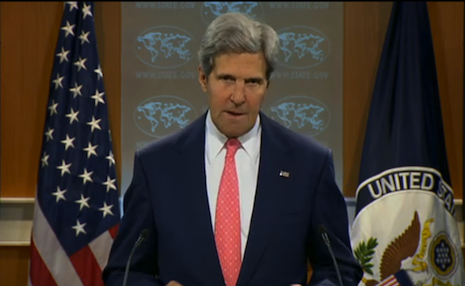U.S. secretary of state John Kerry this afternoon emerged with some strong remarks about the unfolding international situation with respect to Syria, where chemical weapons were unleashed last Wednesday upon civilians in Ghouta in the eastern outskirts of Damascus and that killed up to 1,300 people.![]()
![]()
![]()
Max Fisher at The Washington Post writes that Kerry’s remarks amounted to a ‘war speech,’ that the Obama administration has all but decided to respond to the chemical attack with air strikes. I don’t disagree with that assessment, but the oddest thing about Kerry’s seven minutes on Syria was how much of it he spent arguing that the attacks were real — consider the following exchange:
Last night, after speaking with foreign ministers from around the world about the gravity of this situation, I went back and I watched the videos — the videos that anybody can watch in the social media, and I watched them one more gut-wrenching time. It is really hard to express in words the the human suffering that they lay out before us. As a father, I can’t get the image out of my head of a man who held up his dead child, wailing while chaos swirled around him, the images of entire families dead in their beds without a drop of blood or even a visible wound, bodies contorting in spasms, human suffering that we can never ignore or forget. Anyone who could claim that an attack of this staggering scale could be contrived or fabricated needs to check their conscience and their own moral compass. What is before us today is real, and it is compelling.
It’s no secret that I’m a fan of John Kerry (pictured above) — he’s had a strong start at State and that follows a generally impeccable senatorial record of thoughtful engagement on foreign affairs. But with all due respect, I certainly hope the chief diplomat of the United States of America is spending more time reviewing the intelligence that the U.S., British and French governments allegedly have that implicates the Syrian president Bashar al-Assad in the chemical attack than watching shock footage on YouTube.
No one is arguing that the attack was contrived or fabricated — it’s a horrific slaughter that deserves a united and firm response from the international community conveying that the use of chemical weapons to kill civilians, including women and children, is unacceptable. What remains at issue is determining who was responsible for the attack, and that’s why it was odd to watch Kerry spend more time knocking down a straw-man argument than explaining why the U.S. government is so sure that Assad was responsible for the attack. Earlier today, Saleh Muslim, head of the Kurdish Democratic Union Party (PYD), who has clashed with both pro-Assad and anti-Assad forces, said that he doesn’t believe Assad is responsible for the attacks. It’s a real question, and the U.S. media and the rest of the world should demand an answer.
What’s staggering is that, with all signs pointing to U.S. and British military poised to launch some kind of strike against Assad, the Obama administration still hasn’t made the case for why it believes that Assad — and not anti-Assad extremists looking to draw the international community into Syria’s two-year civil war — is to blame. As many commentators have written, the timing of last week’s attack is incredibly suspicious, given that U.N. weapons inspectors were in Damascus during the attacks and that Assad has generally been gaining ground against the opposition, and there’s plenty of reason why the more radical elements among the anti-Assad opposition want to provoke the world’s ire against Assad.
It’s generally undisputed that Assad has stockpiled chemical weapons in the past, while we don’t know if any rebel group of the opposition now have access to them. But that’s hardly a smoking gun.
The fact that Assad denied U.N. experts to inspect the scene for five days (and then allowed only 90 minutes of access today) is highly suspicious. But in a court of law in the United States, that would amount to circumstantial evidence. Remember that Saddam Hussein hedged over whether he had weapons of mass destruction in 2002 and 2003 mostly because he wanted to deter neighboring Iran. Moreover, I can think of a half-dozen reasons why the Assad regime might hesitate to allow United Nations inspectors into the affected area. (If Assad wasn’t actually responsible for the chemical attack, do you think he has enough control to guarantee the safety of U.N. inspectors from anti-Assad rebels?)
The international community deserves more from the United States, given its track record of failed intelligence over the proliferation of weapons of mass destruction (notably nuclear weapons) in Iraq in 2003. That ‘slam dunk’ intelligence justified an eight-year military effort that catalyzed massive amounts of violence in Iraq. New revelations this morning from Foreign Policy detailing the U.S. government’s complicity and acquiescence in the use of chemical weapons by then-ally Saddam Hussein in Iraq’s war against Iran in the 1980s only underscore the troublesome record that the United States has accrued on this issue. Continue reading Kerry’s forceful remarks on Syria fail to explain why Assad’s to blame


